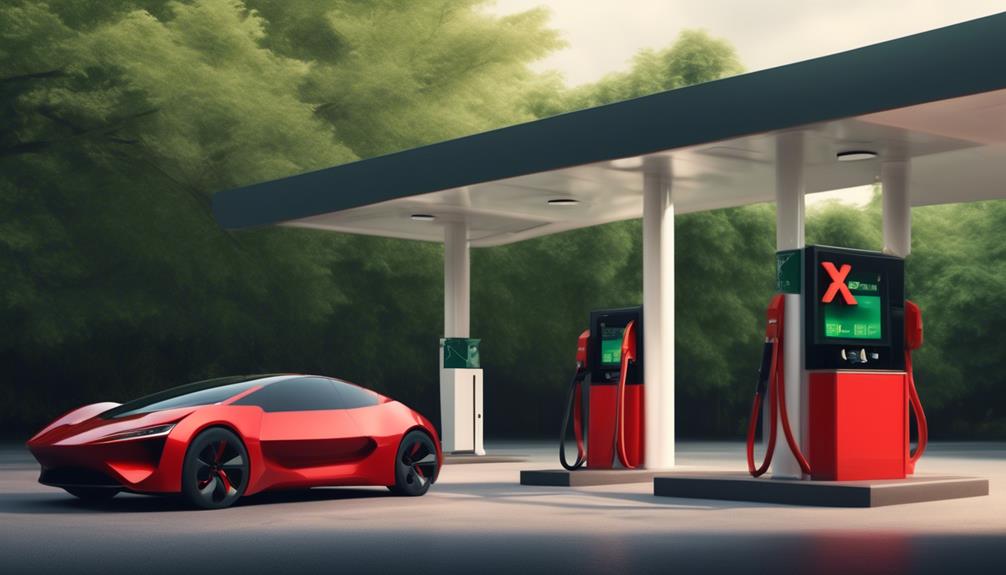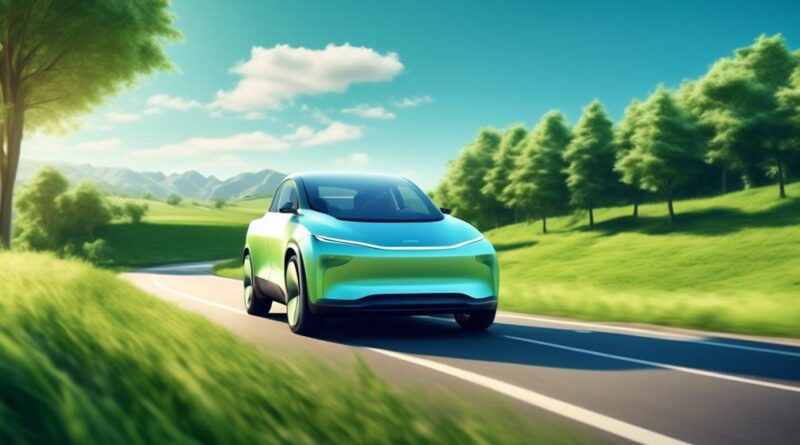8 Best Advantages of Eco-friendly Vehicles
Have you ever considered the true benefits of eco-friendly vehicles?
While it's widely acknowledged that they are better for the environment, there are numerous other advantages that often go overlooked.
From cost savings to reduced maintenance, eco-friendly vehicles offer a range of benefits that could make a significant impact on your daily life.
These advantages not only affect your individual experience but also have broader implications for the future.
Reduced Carbon Emissions
By using eco-friendly vehicles, you can significantly reduce carbon emissions, contributing to a cleaner and healthier environment. The environmental impact of traditional vehicles is substantial, with the transportation sector being one of the largest contributors to carbon dioxide emissions. When you opt for eco-friendly vehicles, such as electric or hybrid cars, you directly reduce the amount of greenhouse gases released into the atmosphere. This reduction in carbon emissions plays a crucial role in mitigating climate change and its associated effects on the environment.
Additionally, the public health benefits of reduced carbon emissions are noteworthy. High levels of carbon emissions are linked to air pollution, which can have detrimental effects on public health. By transitioning to eco-friendly vehicles, you help decrease air pollution, leading to improved air quality. This, in turn, can reduce respiratory problems, cardiovascular diseases, and other health issues associated with poor air quality.
Furthermore, lower levels of air pollution contribute to overall well-being, particularly in urban areas where the concentration of traditional vehicles is high.
Cost Savings on Fuel
Consider the significant cost savings on fuel that come with using eco-friendly vehicles, making them an economical choice for your transportation needs. Eco-friendly vehicles are designed with advanced eco-friendly technology, resulting in exceptional fuel efficiency. By using less fuel per mile, these vehicles not only save you money at the pump but also have a significantly reduced environmental impact.
The long-term savings from reduced fuel consumption can be substantial. With rising fuel prices, the advantage of eco-friendly vehicles becomes even more apparent. The money saved on fuel over the lifespan of the vehicle can be quite substantial, making eco-friendly vehicles a wise investment for the future.
Moreover, eco-friendly technology continues to advance, leading to even greater fuel efficiency and reduced reliance on non-renewable resources. As this technology improves, the cost savings on fuel will only increase, offering a compelling reason to consider eco-friendly vehicles for your next car purchase.
Improved Air Quality
Experience cleaner air in your surroundings with eco-friendly vehicles, which contribute to improved air quality through reduced emissions of harmful pollutants. By choosing eco-friendly vehicles, you're making a positive impact on public health and the environment.
Here's how eco-friendly vehicles help improve air quality:
- Reduced Emissions: Eco-friendly vehicles, such as electric and hybrid cars, produce lower levels of harmful pollutants like carbon monoxide, nitrogen oxides, and particulate matter. This reduction in emissions directly translates to cleaner air and better respiratory health for you and those around you.
- Less Smog Formation: Traditional gasoline-powered vehicles emit pollutants that contribute to the formation of smog, which can have detrimental effects on respiratory health. Eco-friendly vehicles emit fewer of these smog-forming pollutants, helping to reduce the prevalence of smog in urban areas and thereby improving air quality.
- Mitigated Environmental Impact: By choosing eco-friendly vehicles, you're helping to reduce your carbon footprint and decrease the overall environmental impact of transportation. This, in turn, contributes to better air quality and a healthier planet for current and future generations.
Tax Incentives and Rebates
When purchasing an eco-friendly vehicle, you can take advantage of tax incentives and rebates that can help offset the initial cost. Government incentives are designed to encourage the purchase of eco-friendly vehicles by offering financial benefits to consumers. These incentives can come in the form of tax credits, rebates, or even exemptions from certain taxes, all of which can significantly reduce the overall cost of owning an eco-friendly vehicle.
Tax incentives are a way for the government to reward consumers for choosing environmentally friendly transportation options. These incentives can vary by location and are often based on factors such as the vehicle's fuel efficiency and emissions. By taking advantage of these incentives, you can't only save money at the time of purchase but also benefit from ongoing savings through reduced fuel costs and maintenance expenses.
In addition to tax incentives, many governments also offer rebates for purchasing eco-friendly vehicles. These rebates are typically provided as a direct financial incentive to consumers, either at the time of purchase or through a reimbursement process after the sale. By leveraging these rebates, you can further reduce the upfront cost of buying an eco-friendly vehicle, making it a more financially attractive option compared to traditional gasoline-powered cars.
Lower Maintenance Costs
Lower maintenance costs for eco-friendly vehicles can contribute to long-term savings and further offset the initial purchase price, building on the financial advantages gained from tax incentives and rebates. When you opt for an eco-friendly vehicle, you can expect to enjoy the following benefits in terms of lower maintenance costs:
- Extended Lifespan: Eco-friendly vehicles often have components that experience less wear and tear compared to traditional vehicles. For example, electric vehicles have fewer moving parts in their powertrains, which can result in reduced maintenance needs and a longer lifespan for these components. Additionally, the regenerative braking systems in electric vehicles can help extend the lifespan of brake pads, further lowering maintenance expenses over time.
- Simplified Repairs: Eco-friendly vehicles are designed with a focus on efficiency and simplicity, which can make repairs more straightforward and less costly. For instance, electric vehicles have fewer complex internal combustion engine components, leading to potentially lower repair costs. Additionally, the overall design and construction of eco-friendly vehicles often prioritize accessibility to components, making maintenance and repairs easier and more affordable.
Energy Efficiency
You can enhance your understanding of eco-friendly vehicles by exploring their energy efficiency, which directly impacts their environmental impact and operational costs.
One key aspect of energy efficiency in eco-friendly vehicles is hybrid technology, which combines an internal combustion engine with an electric motor. This combination allows the vehicle to optimize fuel economy by using the electric motor during low-speed driving and the combustion engine for higher speeds, resulting in overall reduced fuel consumption and emissions.
Electric power is another crucial element contributing to the energy efficiency of eco-friendly vehicles. Electric vehicles (EVs) produce zero tailpipe emissions, reducing their environmental impact significantly. The use of electric power in hybrid vehicles also contributes to a lower environmental impact compared to traditional gasoline-powered vehicles, as it reduces the overall dependence on fossil fuels and decreases greenhouse gas emissions.
Reduced Dependence on Fossil Fuels

How can eco-friendly vehicles contribute to reducing our dependence on fossil fuels? Making the switch to eco-friendly vehicles can significantly reduce our reliance on fossil fuels, benefiting both the environment and our energy security. Here's how:
- Utilization of Alternative Energy Sources:
Eco-friendly vehicles, such as electric and hybrid cars, rely on alternative energy sources like electricity and hydrogen fuel cells instead of gasoline or diesel. By diversifying the sources of energy used for transportation, we can decrease our dependence on finite fossil fuels and mitigate the environmental impact of their extraction and consumption.
- Reduction in Greenhouse Gas Emissions:
Traditional vehicles powered by fossil fuels are major contributors to greenhouse gas emissions, which significantly impact climate change. Eco-friendly vehicles produce fewer or zero tailpipe emissions, thus helping to combat air pollution and reduce the environmental impact associated with the transportation sector.
- Energy Security and Sustainability:
Embracing eco-friendly vehicles promotes energy security by lessening our reliance on imported fossil fuels. Furthermore, the development and use of alternative energy sources for transportation contribute to a more sustainable energy future, ensuring a more stable and environmentally friendly energy supply.
Contribution to Sustainable Future
By embracing eco-friendly vehicles, we can actively contribute to building a sustainable future for the next generation. The environmental impact of traditional vehicles is significant, contributing to air and noise pollution, as well as greenhouse gas emissions. However, eco-friendly vehicles, such as electric and hybrid cars, offer a sustainable solution to these environmental issues. By transitioning to these vehicles, individuals can significantly reduce their carbon footprint and minimize their impact on the environment.
The long-term benefits of eco-friendly vehicles are substantial. Not only do they help to preserve the environment, but they also promote energy efficiency and conservation. Electric vehicles, for instance, rely on renewable energy sources, which reduces the dependence on finite fossil fuels. This shift towards sustainable energy sources helps to mitigate the environmental degradation associated with traditional vehicles.
Furthermore, embracing eco-friendly vehicles also encourages technological innovation and advancements in sustainable transportation. As more individuals opt for eco-friendly vehicles, there's increased demand for related infrastructure, such as charging stations and renewable energy sources. This, in turn, drives investment in sustainable technologies and promotes economic growth in the renewable energy sector.
Frequently Asked Questions
Are There Any Safety Concerns Specific to Eco-Friendly Vehicles That Consumers Should Be Aware Of?
When considering eco-friendly vehicles, you should be aware of safety concerns related to electric batteries, vehicle maintenance, and power and performance.
Electric batteries in these vehicles pose unique safety challenges, and proper maintenance is crucial to ensure safety.
Additionally, while eco-friendly vehicles offer great efficiency, it's important to understand that their power and performance may not be the same as traditional vehicles.
Stay informed and take necessary precautions for a safe driving experience.
How Do Eco-Friendly Vehicles Compare in Terms of Performance and Power to Traditional Gasoline-Powered Vehicles?
When comparing eco-friendly vehicles to traditional gas-powered ones, you'll find that eco-friendly vehicles offer impressive performance and power. They excel in efficiency, delivering strong acceleration and smooth handling.
Additionally, these vehicles produce lower emissions, contributing to a cleaner environment. With advancements in technology, eco-friendly vehicles are continuously closing the gap in performance and power with traditional gasoline-powered vehicles, making them a compelling choice for environmentally-conscious drivers.
What Are the Potential Drawbacks or Limitations of Tax Incentives and Rebates for Eco-Friendly Vehicles?
When considering the limitations of tax incentives and rebates for eco-friendly vehicles, it's crucial to evaluate their effectiveness in spurring consumer awareness and conducting a cost benefit analysis.
Factors such as the actual impact on consumer behavior and the overall cost effectiveness of these incentives should be carefully assessed.
It's important to ensure that the incentives are structured in a way that truly encourages the adoption of eco-friendly vehicles.
How Do Eco-Friendly Vehicles Impact the Overall Environmental Footprint, Including Factors Such as Manufacturing and Disposal?
When considering the overall environmental footprint, it's important to address the manufacturing impact and disposal considerations of eco-friendly vehicles.
Manufacturing processes for these vehicles often involve fewer emissions and use of sustainable materials, reducing environmental impact.
Additionally, eco-friendly vehicles are designed for easier recyclability at the end of their lifespan, minimizing waste and reducing their overall environmental footprint.
Can Eco-Friendly Vehicles Be Easily Serviced and Repaired, or Are There Specific Challenges Related to Their Maintenance?
When it comes to eco-friendly vehicles, you might wonder about their repairability and servicing. Some challenges can arise due to the unique technology and components, affecting maintenance. However, advancements in training and tools are improving repairability.
Consumer safety and performance are top priorities, and tax incentives can offset costs. Evaluating the environmental footprint of maintenance and repair processes is crucial for understanding the overall impact of eco-friendly vehicles.
Conclusion
In conclusion, eco-friendly vehicles offer a range of benefits, including:
- Reduced carbon emissions
- Cost savings on fuel
- Improved air quality
- Tax incentives and rebates
- Lower maintenance costs
- Energy efficiency
- Reduced dependence on fossil fuels
- Contribution to a sustainable future
Making the switch to eco-friendly vehicles not only benefits the environment, but also your wallet.
So why not make the eco-friendly choice and enjoy these advantages today?
